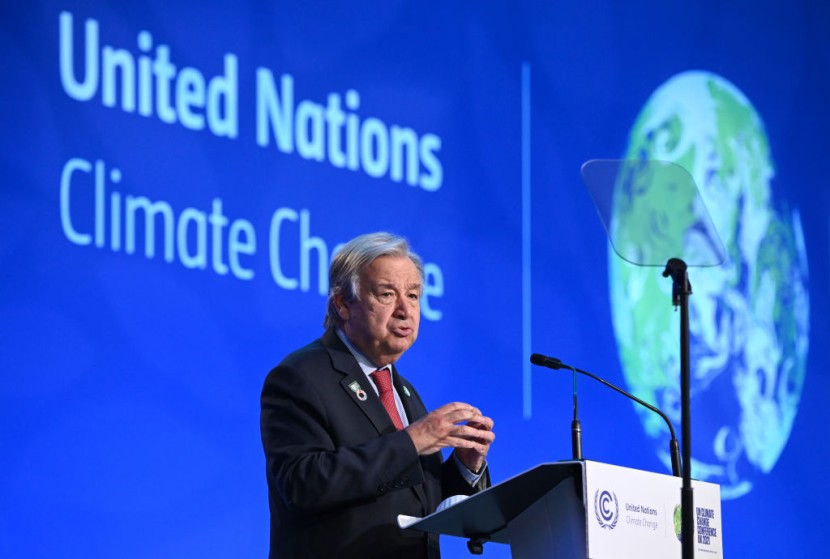
In a dramatic opening statement at the United Nations Climate Ambition Summit in New York City, UN Secretary-General António Guterres declared, "humanity has opened the gates of hell."
His sobering words set the tone for a summit focused on addressing the dire consequences of climate change following the hottest summer, which saw a barrage of extreme weather events linked to rising global temperatures, as per CNN.
UN Chief Sounds Alarm on Climate Crisis at Ambition Summit
Guterres did not mince words as he cataloged the devastating effects of the relentless heat, emphasizing the anguish of farmers who watched their crops washed away by floods and the rise of diseases in the wake of sweltering temperatures.
His call to action echoed louder than ever, demanding more aggressive measures to reduce greenhouse gas emissions and increased financial support for the countries most affected by climate change.
While scientists from the Intergovernmental Panel on Climate Change (IPCC) have unequivocally warned that limiting global warming to 1.5 degrees Celsius (2.7 degrees Fahrenheit) above preindustrial levels is crucial to avoid catastrophic consequences, national pledges to cut emissions have fallen short of this imperative target.
The world has already warmed by 1.1℃, and if current policies continue, we are on track for a catastrophic 2.7℃ (4℉) increase in global temperatures by the end of this century. Guterres aptly described the current state of climate action as "dwarfed by the scale of the challenge."
He emphasized the need to build momentum for more ambitious national climate pledges ahead of the upcoming UN Climate Change Conference, known as COP28, scheduled to commence in Dubai on November 30. However, the two largest global emitters, China and the United States were absent from the list of summit speakers.
Instead, the event featured representatives from countries recently taking significant steps to combat climate change, such as Brazil, Canada, South Africa, and the European Union. Low-lying nations facing existential threats from rising sea levels, like Tuvalu and Pakistan, also shared their perspectives.
The summit showcased the diversity of voices in the climate movement, with speakers from institutions like the World Bank and local governments such as the city of London and the state of California. California, in particular, is leading the charge in climate action, having recently filed a lawsuit against five major oil companies for allegedly deceiving the public about climate science, according to Yahoo.
California's New Carbon Emissions Disclosure Laws
The state also passed legislation mandating carbon emissions disclosure for large companies. Climate activists have long advocated for developed nations to commit to a complete phase-out of fossil fuels, a goal that they argue wealthy countries have been too slow to embrace.
These calls culminated in the "March to End Fossil Fuels," a massive protest involving thousands of activists just days before the summit.
In his dynamic address at the U.N., California Governor Gavin Newsom squarely placed the blame for climate change on the fossil fuel industry, stating, "It's not complicated, it's the burning of oils, the burning of gas, the burning of coal; we need to call that out." Chilean President Gabriel Boric concurred, characterizing the climate crisis as a fossil fuel crisis and emphasizing the urgent need to leave fossil fuels behind.
The core demand voiced by Secretary-General Guterres, climate campaigners, and representatives from vulnerable nations centers on the world's largest economies.
They are calling for more substantial emissions reductions and increased financial support to help less affluent countries transition to clean-energy economies and adapt to the intensifying impacts of climate change, including prolonged heatwaves, more powerful storms, and rising sea levels.
Guterres had previously proposed a "Solidarity Pact" and an "Acceleration Agenda" targeting the world's 20 largest economies.
While the IPCC has stipulated that the world must achieve net-zero emissions by 2050 to avert climate catastrophe, Guterres urges these economies, which have significantly enriched themselves through fossil fuel consumption, to aim for net-zero emissions by 2040.
Reiterating this demand at the summit, Guterres emphasized the need for solidarity among climate champions, particularly in the developing world, to compensate for lost time due to procrastination, manipulation, and the insatiable greed of entrenched interests profiting from fossil fuels.
As the world grapples with the harsh reality of a changing climate, the Climate Ambition Summit is a stark reminder that urgent and comprehensive action is not only necessary but also long overdue.
Secretary-General Guterres' declaration that "humanity has opened the gates of hell" underscores the pressing need for a global response that matches the scale of the climate challenge, CNBC reported.
Related Article: Maui Landowners Sued for Role in Wildfire Spread
© 2025 HNGN, All rights reserved. Do not reproduce without permission.








